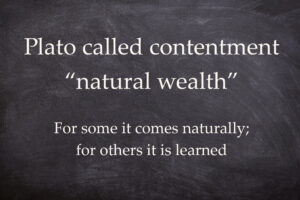“I want a baby brother for Christmas!” she shrieked, lunging from her chair. She’d made her desire known. It was a demand really.
“Yes! We all want a baby brother for Christmas!” her sisters joined in, jumping up and down, eyes dancing with anticipation.
“You have two boy cousins,” someone dead panned.
Right. The first obstacle would be catching them. The boys are 7 and 9, run fast, shinny up trees, roll in the mud and have a thing for animal bones they find in the woods. The second obstacle would be pretending they smelled fresh, were completely helpless and wanted to be spoon fed pureed vegetables.
They were momentarily quiet, then resumed pleading for a baby brother.
“You don’t always get what you want,” I said. “That’s Rule No. 38 of Life.”
Silence. They were stunned. They never knew there were rules for life, let alone 38 of them and possibly more. What else had the grown-ups been hiding?
“Rule No. 1,” their dad said, “is to be content with what you have.”
Score one for Dad. He has introduced the basic structure of thankfulness—contentment.
Contentment is not the same as complacency or resignation; those can be the fast track to despondency. Contentment does not mean you never yearn for things to be different or better. God forbid we should ever destroy the seeds of hopes and dreams.
Contentment is comprehending and appreciating the goodness that surrounds us even now. Living in a materialistic culture, we think of blessings as things like a roof overhead and a working furnace—and those are wonderful blessings. But blessings are also essence, gratitude for another day of life, the joy of hearing a loved one’s voice, the comfort of friendship, the beauty of sunrise and the colors of fall.
Plato called contentment “natural wealth.” It may be natural for some, but for others it must be learned. In a well-known Bible verse, the Apostle Paul wrote, “I have learned to be content in whatever circumstance I am.”
The man had been shipwrecked, chased out of town, beaten, in poor health, imprisoned and in chains. Yet he had learned contentment. That doesn’t sound like a course most of us would want to sign up for. Life sends odd teachers.
Contentment and gratitude are habits of the heart. Twenty-one days was once considered the standard for the time it takes to form a new habit. That figure has been updated to 66 days. Good things require time and fortitude.
It is amazing how people who suffer much in this world are often among the most cheerful and thankful. They are the ones who have learned well, the ones who have acquired the “natural wealth” of contentment and thanksgiving.
An old hymn says it well:
When upon life’s billows you are tempest tossed,
When you are discouraged thinking all is lost.
Count your blessings, name them one by one.
Count your blessings, see what God has done.

